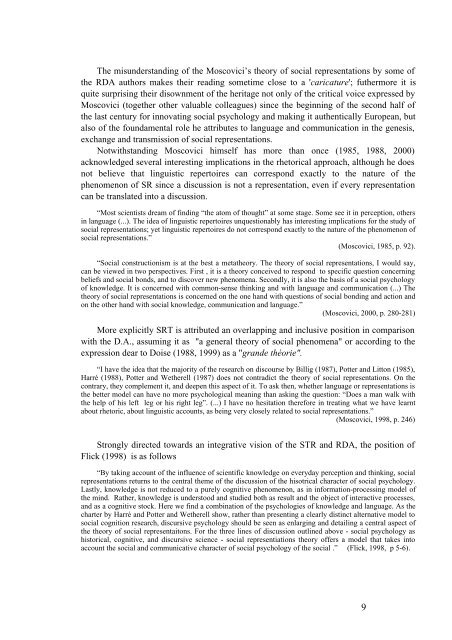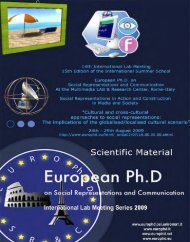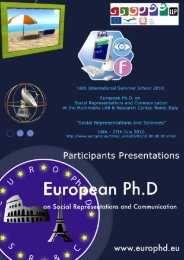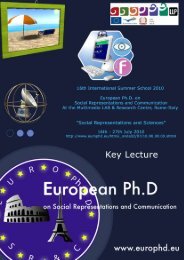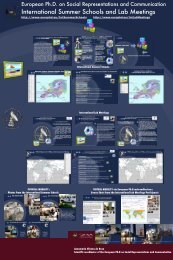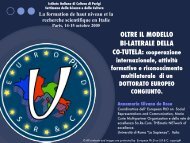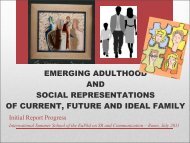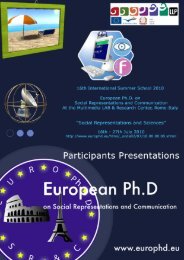The "boomerang" effect of the radicalism in discourse analysis
The "boomerang" effect of the radicalism in discourse analysis
The "boomerang" effect of the radicalism in discourse analysis
You also want an ePaper? Increase the reach of your titles
YUMPU automatically turns print PDFs into web optimized ePapers that Google loves.
<strong>The</strong> misunderstand<strong>in</strong>g <strong>of</strong> <strong>the</strong> Moscovici’s <strong>the</strong>ory <strong>of</strong> social representations by some <strong>of</strong><br />
<strong>the</strong> RDA authors makes <strong>the</strong>ir read<strong>in</strong>g sometime close to a 'caricature'; fu<strong>the</strong>rmore it is<br />
quite surpris<strong>in</strong>g <strong>the</strong>ir disownment <strong>of</strong> <strong>the</strong> heritage not only <strong>of</strong> <strong>the</strong> critical voice expressed by<br />
Moscovici (toge<strong>the</strong>r o<strong>the</strong>r valuable colleagues) s<strong>in</strong>ce <strong>the</strong> beg<strong>in</strong>n<strong>in</strong>g <strong>of</strong> <strong>the</strong> second half <strong>of</strong><br />
<strong>the</strong> last century for <strong>in</strong>novat<strong>in</strong>g social psychology and mak<strong>in</strong>g it au<strong>the</strong>ntically European, but<br />
also <strong>of</strong> <strong>the</strong> foundamental role he attributes to language and communication <strong>in</strong> <strong>the</strong> genesis,<br />
exchange and transmission <strong>of</strong> social representations.<br />
Notwithstand<strong>in</strong>g Moscovici himself has more than once (1985, 1988, 2000)<br />
acknowledged several <strong>in</strong>terest<strong>in</strong>g implications <strong>in</strong> <strong>the</strong> rhetorical approach, although he does<br />
not believe that l<strong>in</strong>guistic repertoires can correspond exactly to <strong>the</strong> nature <strong>of</strong> <strong>the</strong><br />
phenomenon <strong>of</strong> SR s<strong>in</strong>ce a discussion is not a representation, even if every representation<br />
can be translated <strong>in</strong>to a discussion.<br />
“Most scientists dream <strong>of</strong> f<strong>in</strong>d<strong>in</strong>g “<strong>the</strong> atom <strong>of</strong> thought” at some stage. Some see it <strong>in</strong> perception, o<strong>the</strong>rs<br />
<strong>in</strong> language (...). <strong>The</strong> idea <strong>of</strong> l<strong>in</strong>guistic repertoires unquestionably has <strong>in</strong>terest<strong>in</strong>g implications for <strong>the</strong> study <strong>of</strong><br />
social representations; yet l<strong>in</strong>guistic repertoires do not correspond exactly to <strong>the</strong> nature <strong>of</strong> <strong>the</strong> phenomenon <strong>of</strong><br />
social representations.”<br />
(Moscovici, 1985, p. 92).<br />
“Social constructionism is at <strong>the</strong> best a meta<strong>the</strong>ory. <strong>The</strong> <strong>the</strong>ory <strong>of</strong> social representations, I would say,<br />
can be viewed <strong>in</strong> two perspectives. First , it is a <strong>the</strong>ory conceived to respond to specific question concern<strong>in</strong>g<br />
beliefs and social bonds, and to discover new phenomena. Secondly, it is also <strong>the</strong> basis <strong>of</strong> a social psychology<br />
<strong>of</strong> knowledge. It is concerned with common-sense th<strong>in</strong>k<strong>in</strong>g and with language and communication (...) <strong>The</strong><br />
<strong>the</strong>ory <strong>of</strong> social representations is concerned on <strong>the</strong> one hand with questions <strong>of</strong> social bond<strong>in</strong>g and action and<br />
on <strong>the</strong> o<strong>the</strong>r hand with social knowledge, communication and language.”<br />
(Moscovici, 2000, p. 280-281)<br />
More explicitly SRT is attributed an overlapp<strong>in</strong>g and <strong>in</strong>clusive position <strong>in</strong> comparison<br />
with <strong>the</strong> D.A., assum<strong>in</strong>g it as "a general <strong>the</strong>ory <strong>of</strong> social phenomena" or accord<strong>in</strong>g to <strong>the</strong><br />
expression dear to Doise (1988, 1999) as a "grande théorie".<br />
“I have <strong>the</strong> idea that <strong>the</strong> majority <strong>of</strong> <strong>the</strong> research on <strong>discourse</strong> by Billig (1987), Potter and Litton (1985),<br />
Harré (1988), Potter and We<strong>the</strong>rell (1987) does not contradict <strong>the</strong> <strong>the</strong>ory <strong>of</strong> social representations. On <strong>the</strong><br />
contrary, <strong>the</strong>y complement it, and deepen this aspect <strong>of</strong> it. To ask <strong>the</strong>n, whe<strong>the</strong>r language or representations is<br />
<strong>the</strong> better model can have no more psychological mean<strong>in</strong>g than ask<strong>in</strong>g <strong>the</strong> question: “Does a man walk with<br />
<strong>the</strong> help <strong>of</strong> his left leg or his right leg”. (...) I have no hesitation <strong>the</strong>refore <strong>in</strong> treat<strong>in</strong>g what we have learnt<br />
about rhetoric, about l<strong>in</strong>guistic accounts, as be<strong>in</strong>g very closely related to social representations.”<br />
(Moscovici, 1998, p. 246)<br />
Strongly directed towards an <strong>in</strong>tegrative vision <strong>of</strong> <strong>the</strong> STR and RDA, <strong>the</strong> position <strong>of</strong><br />
Flick (1998) is as follows<br />
“By tak<strong>in</strong>g account <strong>of</strong> <strong>the</strong> <strong>in</strong>fluence <strong>of</strong> scientific knowledge on everyday perception and th<strong>in</strong>k<strong>in</strong>g, social<br />
representations returns to <strong>the</strong> central <strong>the</strong>me <strong>of</strong> <strong>the</strong> discussion <strong>of</strong> <strong>the</strong> hisotrical character <strong>of</strong> social psychology.<br />
Lastly, knowledge is not reduced to a purely cognitive phenomenon, as <strong>in</strong> <strong>in</strong>formation-process<strong>in</strong>g model <strong>of</strong><br />
<strong>the</strong> m<strong>in</strong>d. Ra<strong>the</strong>r, knowledge is understood and studied both as result and <strong>the</strong> object <strong>of</strong> <strong>in</strong>teractive processes,<br />
and as a cognitive stock. Here we f<strong>in</strong>d a comb<strong>in</strong>ation <strong>of</strong> <strong>the</strong> psychologies <strong>of</strong> knowledge and language. As <strong>the</strong><br />
charter by Harré and Potter and We<strong>the</strong>rell show, ra<strong>the</strong>r than present<strong>in</strong>g a clearly dist<strong>in</strong>ct alternative model to<br />
social cognition research, discursive psychology should be seen as enlarg<strong>in</strong>g and detail<strong>in</strong>g a central aspect <strong>of</strong><br />
<strong>the</strong> <strong>the</strong>ory <strong>of</strong> social representaitons. For <strong>the</strong> three l<strong>in</strong>es <strong>of</strong> discussion outl<strong>in</strong>ed above - social psychology as<br />
historical, cognitive, and discursive science - social representiations <strong>the</strong>ory <strong>of</strong>fers a model that takes <strong>in</strong>to<br />
account <strong>the</strong> social and communicative character <strong>of</strong> social psychology <strong>of</strong> <strong>the</strong> social .” (Flick, 1998, p 5-6).<br />
9


